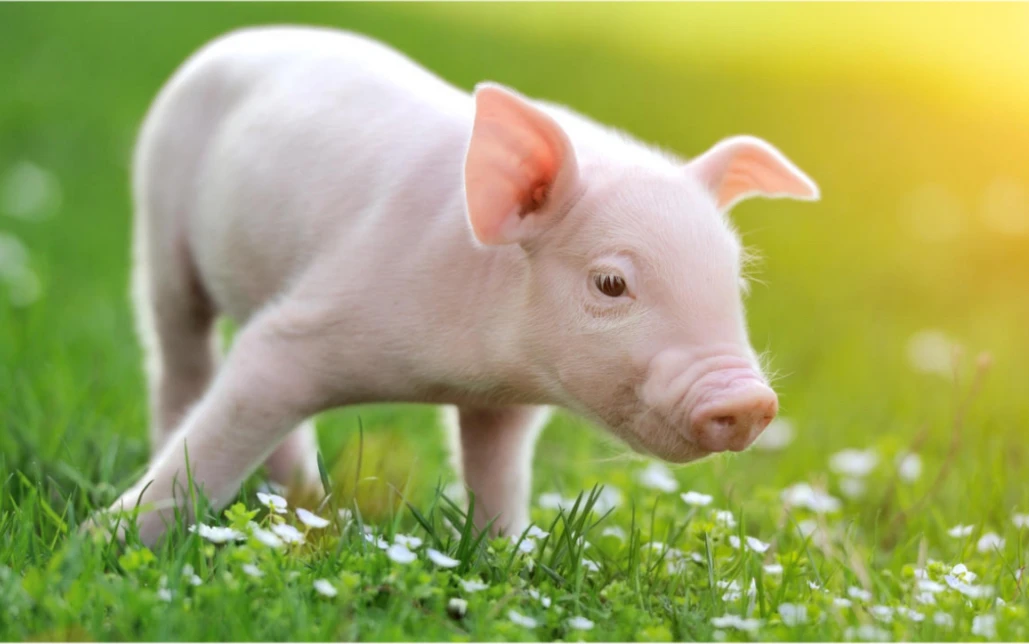Characteristics of Pig
Habitat
Farms and domestic environments
Diet
Omnivore - vegetables, fruits, grains
Lifespan
10-15 years
Weight
110-350 kg
Length
0.9-1.8 m
Region
Worldwide
Pig Sound Characteristics
The pig sound repertoire is diverse and communicative. From the iconic oink to various grunt and squeal, the pig sound reveals their high intelligence and social complexity. Each pig sound serves a specific purpose in their sophisticated communication system.
Oink
The classic pig sound recognized worldwide. This distinctive pig sound is produced by pushing air through the nasal cavity. The oinking pig sound varies in pitch and rhythm depending on the pig's mood and intention. Domestic pigs develop different oink patterns based on their environment and social group.
300-800 Hz
60-85 decibels
0.5-2 seconds
During social interaction, when excited, or seeking attention
Grunt
A short, low-pitched pig sound used during feeding and casual interaction. This common pig sound indicates contentment and basic communication. Pigs exchange grunting sound frequently within their social group. The grunting pig sound is the most frequently heard vocalization in relaxed settings.
200-500 Hz
50-70 decibels
0.3-1 second
While feeding, during relaxed social interaction, or when exploring
Squeal
A high-pitched pig sound expressing distress or excitement. This intense pig sound can reach extraordinary volume when the pig is alarmed. The squealing pig sound serves as an alarm to alert other pigs to potential danger. Young pigs produce this sound more frequently than adults.
1,000-3,000 Hz
90-115 decibels
1-5 seconds
When frightened, in pain, extremely excited, or during conflict
Maternal Song
A rhythmic, melodic pig sound produced by nursing mothers. This soothing pig sound helps maintain contact with piglets during nursing. The maternal pig sound has a unique pattern specific to each sow. Piglets learn to recognize their mother's distinctive sound shortly after birth.
250-700 Hz
55-75 decibels
3-10 seconds
During nursing, when calling piglets, or while building nests
Interesting Pig Sound Facts
The pig sound of squealing can reach 115 decibels, louder than a motorcycle
Each pig develops a unique vocal signature in their sound
Piglets learn to recognize their mother's specific sound within hours of birth
Pigs use different sound patterns when communicating with humans versus other pigs
The pig sound repertoire includes over 20 distinct vocalization types
Interesting Facts about Pig Sound
Pigs are considered the fourth most intelligent animal in the world
They can run at speeds of up to 11 mph, making them quite athletic
Pigs are one of the few animals that can use tools
A pig's squeal can reach up to 115 decibels, louder than a supersonic jet
Pigs have an excellent sense of smell and can be trained to find truffles
Mother pigs sing to their piglets while nursing
FAQs about Pig Sound
Find answers to all your questions about Pig sounds
Q Why do pigs make the oinking sound?
Pigs produce the oinking sound primarily for social communication. This distinctive pig sound helps maintain contact with other pigs in their group. The oinking pig sound can indicate excitement, greeting, or a request for attention. Domestic pigs often direct this sound toward their caretakers when anticipating food or interaction.
Q What does a pig sound like when happy?
A content pig typically produces a soft grunting sound. This relaxed pig sound is low-pitched and rhythmic, often heard during feeding or comfortable rest. The happy pig sound may include gentle oinking interspersed with steady grunts. This positive pig sound is distinctly different from the high-pitched squeal associated with distress.
Q How loud can a pig sound be?
The pig sound can reach extraordinary volume, particularly when squealing. A distressed pig sound can measure up to 115 decibels, comparable to a rock concert or jet engine. This powerful pig sound evolved as an effective alarm system in the wild. The extreme volume of a pig sound helps alert the entire social group to potential danger.
Q Do different pig breeds make different sound?
Different pig breeds produce subtle variations in their sound. Heritage breeds often have more diverse pig sound repertoires than modern production breeds. The Vietnamese pot-bellied pig sound tends to be higher-pitched than larger farm breed vocalization. These differences in pig sound reflect their genetic heritage and historical uses.
Q What sound does a baby pig make?
Baby pigs (piglets) produce a distinctive high-pitched sound often described as a whistle or chirp. This infant pig sound helps maintain contact with their mother. The piglet sound becomes more pig-like as they mature, gradually developing the deeper oink and grunt. The young pig sound is particularly energetic during feeding time or when separated from their mother.
Q Can pigs recognize each other by sound?
Pigs have excellent sound recognition abilities. Each pig develops a unique vocal signature that others can identify. Mother pigs can distinguish their piglets' specific sound from others in the litter. This pig sound recognition helps maintain family bonds and social structure. The ability to identify individual pig sound is crucial in their complex social groups.
Q Do wild pigs make the same sound as farm pigs?
Wild pigs (boars) produce a more diverse range of sound than their domestic counterparts. The wild pig sound includes deeper grunts and more aggressive warning call. Wild boars rarely make the classic oinking pig sound associated with domestic pigs. These differences in pig sound reflect their different lifestyles and environmental challenges.
Q Can pigs communicate with humans through sound?
Pigs readily adapt their sound for human interaction. They often develop specific pig sound patterns directed at their caretakers. A pig may use different sound to request food versus attention or outdoor access. This adaptable pig sound communication demonstrates their remarkable intelligence and social awareness. Many pig owners report their animals develop unique 'words' through consistent sound patterns.
Most Downloaded mammals Animal Sounds
Discover our most popular mammals animal sounds
